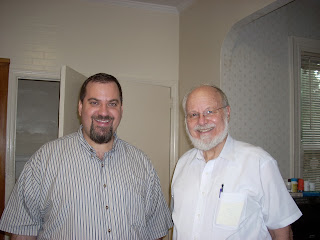Is God meaningful or just Judaism?
I don’t have much of a relationship with God the individual, per se, but I do have a strong relationship with spirituality.
Part of the problem is that I don’t believe that the Torah is divine, though I’d like to think it has divinity in some of the parts that ended up making it into the composite document. And it seems unlikely that many of the events in the Torah really happened or that many of the characters really existed. So what does that leave God to do? Create the universe, I guess – set in motion the grand 14 billion year old symphony of the cosmos. I believe in God, but in a rather abstract way.
But I DO believe in Judaism. And in spirituality. When singing zmirot on Shabbat, or studying an amazingly fascinating piece of gemara, I feel connected to 3,000 years of our history in a very deep & meaningful way. I may think it unlikely that Moshe Rabbeinu really existed, but Rabbi Akiva almost certainly did exist. So did Rambam. And so did 100 generations of our ancestors, striving to reach for the divine, trying to make sense of the world, and sensing SOMETHING greater out there, something elusive that they called God. They devised rituals and created narratives to reach God. That is how my ancestors connected to that divine spark, and that’s why it’s meaningful to me.
Original comments from old blog:
-
April 5, 2012 at 12:24 pm | #3Don’t you think it’s hypocritical to hide your heartfelt beliefs from people, just because you’re worried that they’d ostracize you?
-
May 31, 2012 at 6:33 am | #4I’m probably too literal-minded, but what value could Rabi Akiva have to you if he was lying about Moshe Rabbeinu’s existence?From what you say, either: 1. Rabi Akiva was misguided and falsely believed Moshe Rabbeinu existed. 2. Rabi Akiva knowingly deceived people because it was for their own benefit. or 3. Rabi Akiva wasn’t sure about Moshe Rabbeinu, but like you, thought Judaism had enough to offer that perhaps it was worth it to perpetuate and evolve Judaism into something better for people.Either way it seems you have a relatively low opinion of Rabi Akiva, or a relatively high opinion of yourself. (In the most optimistic scenario (3), you are his equal, in the worst scenario (1) you are smarter than he.)
-
March 2, 2013 at 5:42 pm | #6This is a very good view of religion. Very healthy. I spent a year in a kiruv yeshiva. This would never fly – if you were to teach this, I think they would blow their top.The reason is, kiruv exists for two reasons.The first is to bring people back. Assimilation is rampant. Intermarriage is rampant. Jews are leaving or have left orthodox Judaism in huge numbers.Secular Jews actually may share your perspective (they certainly could respect it.) But it is not nearly enough to get them to feel compelled to live halachic lives. It just jibes with their overall appreciation for films like Fiddler on the Roof, and the occasional marking of a holiday, certainly Passover.Therefore, the only way kiruv felt they could fight the rampant disinterest in halachic Judaism is to fight fire with FIRE. So they torture the text, assert the literal truth of Torah, back it up with empty, hollow proofs, love bomb you, do some supernatural fear mongering, tell you they’ll find you a wife or husband, and tell you it is ok not to work – this sounds pretty good!It is also pretty shameful, weak, and wicked. I do believe in the concept of the “evil inclination,” and this is an appeal to that. Pretty seductive.The second reason kiruv exists is to inspire the kiruv professionals and other orthodox people to continue to practice Judaism. You get students who think you really know. You get to idealize and package Judaism as this fantastic and true thing. You get to watch seculars buy what you say, revere you as someone special and with spiritual expertise. It’s a rush, an appeal to your ego, and will push you to remember why you are frum in the first place. But it is also an appeal to your evil inclination.Hmmmm….Tuvia


Comments
Post a Comment